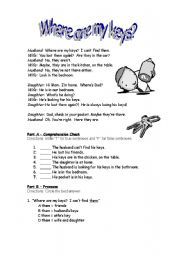
|
prepositions of location
prepositions of location: dialogue, comprehension questions, learn by drawing
Level: elementary
Age: 14-17
Type: grammar-guide
Downloads: 2
|
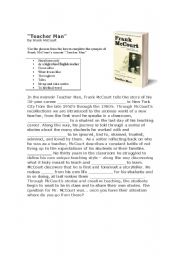
|
Introduction actiities to Penguin Reader: TEACHER MAN by Frank McCourt
These are some introductory in class activities to generate interest and encouragement in reading the Penguin graded reader: Teacher Man by Frank McCourt. The listening can be easily downloaded from the link provided in the worksheet. The listening focuses on an excerpt of Frank McCourt reading from his book where he talks about his rather humoro...
Level: intermediate
Age: 14-17
Type: others
Downloads: 11
|
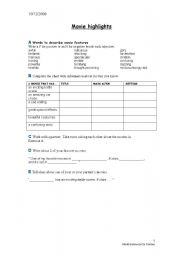
|
Talking about movies
worksheets for working on vocabulary related to talking about movies, and expressing shared and unshared experiences (ex. so do I/ neither am I...)
Level: intermediate
Age: 14-17
Type: worksheet
Downloads: 5
|
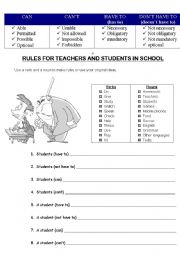
|
rules for teachers and students
can be used in many different ways: as a worksheet, OR divide the class into separate groups to decide the rules for either teachers or for students, then pair students up to orally explain the rules they decided with their previous group
Level: elementary
Age: 9-17
Type: worksheet
Downloads: 44
|
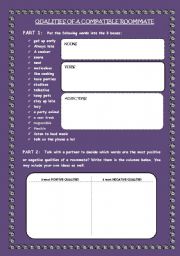
|
Questions with BE or Do - finding a perfect roommate
To help students identify when to use BE or DO in questions and then to practice orally by interviewing classmates as prospective roommates
Level: elementary
Age: 14-17
Type: activity-card
Downloads: 15
|
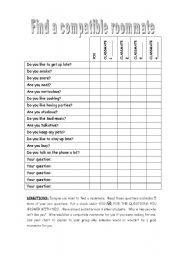
|
roommate compatibility interview
a controlled speaking activity where students have the task of finding a compatible roommate among their classmates by asking a few simple present questions
Level: elementary
Age: 14-17
Type: others
Downloads: 44
|
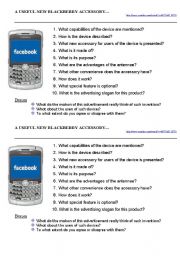
|
The Blackberry Helmet
A funny listening practice based on Rick Merer�s Blackberry helmet parody on the topic of addiction to our technology. You tube link is included.
Level: advanced
Age: 14-17
Type: others
Downloads: 40
|
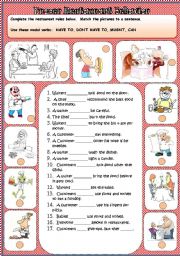
|
Modal Verbs for Restaurant Rules
Complete the sentence with an appropriate modal: HAVE TO, DONT HAVE TO, MUSTN�T, CAN. Then match the pictures to one of the sentences.
Level: elementary
Age: 9-12
Type: worksheet
Downloads: 170
|
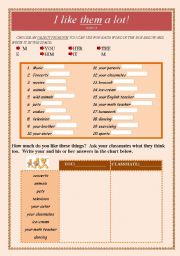
|
Object pronouns with the verb LIKE
Students first write the corresponding object pronoun in the blanks. Then paractice speaking by asking a partner if they like the items on the list, and noting down the response. The list of items is different for Student A and Student B. This could be followed up by asking students to report their findings to the class and thus getting speaking...
Level: elementary
Age: 10-17
Type: activity-card
Downloads: 6
|
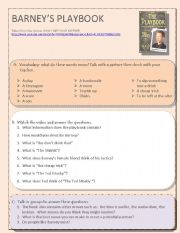
|
video listening - Barney�s Playbook
A listening based on a clip from how I met your mother (youtube link included). Students clarify vocabulary, listen / watch and answer comprehension questions, then discuss a few questions with a partner related to the topic.
Level: advanced
Age: 14-17
Type: worksheet
Downloads: 15
|